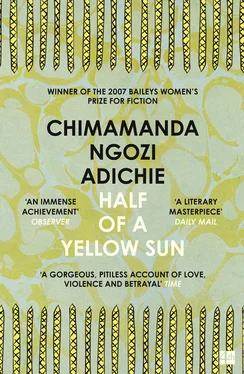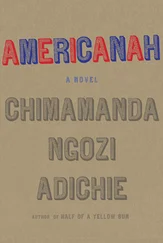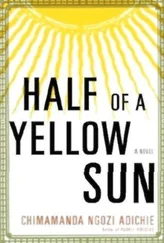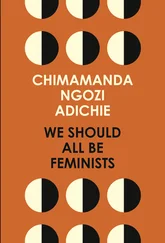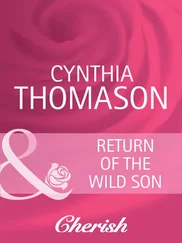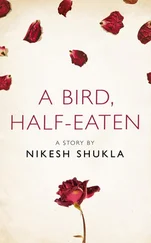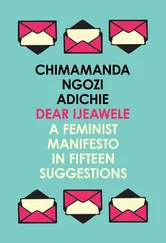‘Hello,’ Richard said. It was too intimate, to hear this mammoth man with the slightly condescending smile on his face say Kainene’s name like that, as if he knew Kainene very well, as if he knew something that Richard did not know, as if whatever Kainene had told him about Richard had been whispered in his ear, amid the silly giggles born of physical intimacy. And what sort of name was Madu Madu anyway? Richard sat on a sofa and refused Kainene’s offer of a drink. He felt pale. He wished Kainene had said, This is my lover, Richard .
‘So you and Kainene met in Lagos?’ Major Madu asked.
‘Yes,’ Richard said.
‘She first told me about you when I called her from Pakistan about a month ago.’
Richard could not think of what to say. He did not know Kainene had talked to him from Pakistan and did not remember her ever mentioning a friendship with an army officer whose first name and surname were the same. ‘And how long have you known each other?’ Richard asked, and immediately wondered if he sounded suspicious.
‘My family’s compound in Umunnachi is right next to the Ozobias’.’ Major Madu turned to Kainene. ‘Aren’t our forefathers said to be related? Only that your people stole our land and we cast you out?’
‘It was your people who stole the land,’ Kainene said, and laughed. Richard was surprised to hear the husky tone of her laughter. He was even more surprised at how familiarly Major Madu behaved, the way he sank into the sofa, got up to flip the album in the stereo, joked with the stewards serving dinner. Richard felt left out of things. He wished Kainene had told him that Major Madu would be staying for dinner. He wished she would drink gin and tonic like him rather than whisky with water like Major Madu. He wished the man would not keep asking him questions, as if to engage him, as if the man were the host and Richard the visitor. How are you enjoying Nigeria? Isn’t the rice delicious? How is your book going? Do you like Nsukka?
Richard resented the questions and the man’s perfect table manners.
‘I trained at Sandhurst’, Major Madu said, ‘and what I hated most was the cold. Not least because they made us run every morning in the bloody cold with only a thin shirt and shorts on.’
‘I can see why you’d find it cold,’ Richard said.
‘Oh, yes. To each his own. I’m sure you’ll soon get very homesick here,’ he said.
‘I don’t think so at all,’ Richard said.
‘Well, the British have just decided to control immigration from the Commonwealth, haven’t they? They want people to stay in their own countries. The irony, of course, is that we in the Commonwealth can’t control the British moving to our countries.’
He chewed his rice slowly and examined the bottle of water for a moment, as if it were wine whose vintage he wanted to know.
‘Right after I came back from England, I was part of the Fourth Battalion that went to the Congo, under the United Nations. Our battalion wasn’t well run at all, but despite that, I preferred Congo to the relative safety of England. Just because of the weather.’ Major Madu paused. ‘We weren’t run well at all in the Congo. We were under the command of a British colonel.’ He glanced at Richard and continued to chew.
Richard bristled; his fingers felt stiff and he feared his fork would slip from his grasp and this insufferable man would know how he felt.
The doorbell rang just after dinner while they sat on the moonlit veranda, drinking, listening to High Life music.
‘That must be Udodi, I told him to meet me here,’ Major Madu said.
Richard slapped at an irritating mosquito near his ear. Kainene’s house seemed to have become a meeting place for the man and his friends.
Udodi was a smallish, ordinary-looking man with nothing of the knowing charm or subtle arrogance of Major Madu. He seemed drunk, almost manic, in the way he shook Richard’s hand, pumping up and down. ‘Are you Kainene’s business associate? Are you in oil?’ he asked.
‘I didn’t do the introductions, did I?’ Kainene said. ‘Richard, Major Udodi Ekechi is a friend of Madu’s. Udodi, this is Richard Churchill.’
‘Oh,’ Major Udodi said, his eyes narrowing. He poured some whisky into a glass, drank it in one gulp, and said something in Igbo to which Kainene replied, in cold, clear English, ‘My choice of lovers is none of your business, Udodi.’
Richard wished he could open his mouth and fluidly tell the man off, but he said nothing. He felt helplessly weak, the kind of weakness that came with illness, with grief. The music had stopped and he could hear the far-off whooshing of the sea’s waves.
‘Sorry, oh! I did not say it was my business!’ Major Udodi laughed and reached again for the bottle of whisky.
‘Easy now,’ Major Madu said. ‘You must have started early at the mess.’
‘Life is short, my brother!’ Major Udodi said, pouring another drink. He turned to Kainene. ‘ I magonu , you know, what I am saying is that our women who follow white men are a certain type, a poor family and the kind of bodies that white men like.’ He stopped and continued, in a mocking mimicry of an English accent, ‘Fantastically desirable bottoms.’ He laughed. ‘The white men will poke and poke and poke the women in the dark but they will never marry them. How can! They will never even take them out to a good place in public. But the women will continue to disgrace themselves and struggle for the men so they will get chicken-feed money and nonsense tea in a fancy tin. It’s a new slavery, I’m telling you, a new slavery. But you are a Big Man’s daughter, so what you are doing with him?’
Major Madu stood up. ‘Sorry about this, Kainene. The man isn’t himself.’ He pulled Major Udodi up and said something in swift Igbo.
Major Udodi was laughing again. ‘Okay, okay, but let me take the whisky. The bottle is almost empty. Let me take the whisky.’
Kainene said nothing as Major Udodi took the bottle from the table. After they left, Richard sat next to her and took her hand. He felt as if he had disappeared, as if that was the reason Major Madu did not include him in the apology. ‘He was dreadful. I’m sorry he did that.’
‘He was hopelessly drunk. Madu must feel terrible right now,’ Kainene said. She gestured to the file on the table and added, ‘I’ve just got the contract to supply army boots for the battalion in Kaduna.’
‘That’s nice.’ Richard drank the last drop from his glass and watched as Kainene looked through the file.
‘The man in charge was Igbo, and Madu said he was keen to give the contract to a fellow Igbo. So I was lucky. And he’s asking only for a five per cent cut.’
‘A bribe?’
‘Oh, aren’t we innocent.’
Her mockery irritated him, as did the speed with which she had absolved Major Madu of any responsibility for Major Udodi’s boorish behaviour. He stood up and began to pace the veranda. Insects were humming around the fluorescent bulb.
‘You’ve known Madu for very long then,’ he said finally. He hated calling the man by his first name; it assumed a cordiality he did not feel. But then he had no choice. He would certainly not call him Major; using a title would be too elevating.
Kainene looked up. ‘Forever. His family and ours are very close. I remember once, years ago, when we went to Umunnachi to spend Christmas, he gave me a tortoise. The strangest and best present I ever got from anybody. Olanna thought it was wrong of Madu to take the poor thing out of its natural habitat and whatnot, but she didn’t much get along with Madu anyway. I put it in a bowl, and of course it died soon afterwards.’ She went back to looking through the file.
‘He’s married, isn’t he?’
Читать дальше
